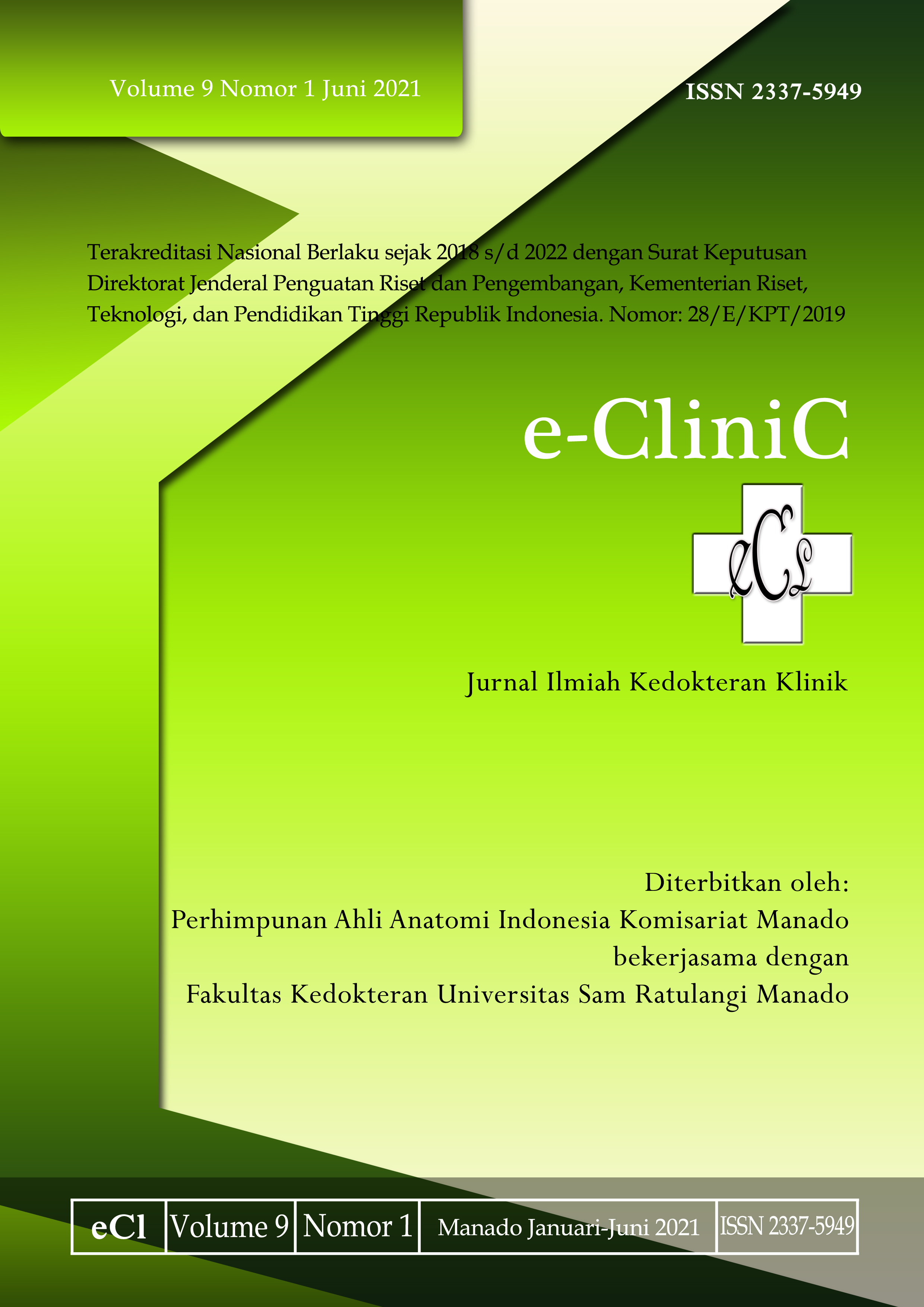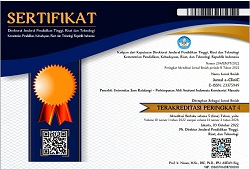Pneumonia Covid-19 dengan Gangguan Ginjal Akut
DOI:
https://doi.org/10.35790/ecl.v9i1.32303Abstract
Abstract: SARS-CoV-2 infection causes various symptoms, including mild, moderate, severe, and critical symptoms. Severe SARS-CoV-2 infection can cause pneumonia, acute respiratory syndrome, kidney failure, and even death. This study was aimed to evaluate patients with COVID-19 pneumonia associated with acute kidney injury (AKI). This was a literature review study using three databases, namely PubMed, ClinicalKey, and Google Scholar. The keywords used were acute kidney injury AND pneumonia AND COVID-19. The results showed 10 selected literatures based on inclusion and exclusion criteria. All literatures stated that males dominated the study samples (52.4-73%). The risk factors of AKI in COVID-19 pneumonia were co-morbidities which were predominantly hypertension, diabetes mellitus, COPD, cardiovascular diseases, and respiratory diseases, as well as nephrotoxic drugs. AKI was the complication of pneumonia COVID-19. The mortality rate was higher among pneumonia COVID-19 patients with AKI compared to pneumonia COVID-19 patients without AKI. In conclusion, AKI is the complication of COVID-19 pneumonia. Nephrotoxic drugs and co-morbidities are the risk factors of AKI in COVID-19 pneumonia. Â The mortality rate is higher in patients with AKI compared to those without AKI.
Keywords: acute kidney injury, pneumonia COVID-19, coronavirus disease 2019
 ÂAbstrak: Infeksi SARS-CoV-2 menimbulkan berbagai gejala baik yang ringan, sedang, berat        hingga kritis. Infeksi SARS-CoV-2 yang berat dapat menyebabkan pneumonia, sindrom pernapasan akut, gagal ginjal, bahkan kematian. Penelitian ini bertujuan untuk mengetahui gambaran pneumonia COVID-19 dengan gangguan ginjal akut (GGA). Jenis penelitian ialah literature review dengan pencarian data menggunakan tiga database yaitu PubMed, ClinicalKey, dan Google Scholar. Kata kunci yang digunakan ialah acute kidney injury AND pneumonia AND COVID-19. Hasil penelitian mendapatkan 10 literatur berdasarkan kriteria inklusi dan eksklusi. Pada semua literatur didapatkan jenis kelamin laki-laki yang mendominasi sampel penelitian (52,4-73%). Riwayat penyakit didominasi oleh hipertensi, diabetes melitus, PPOK, penyakit kardiovaskuler, dan penyakit pernapasan. GGA merupakan komplikasi pada pneumonia COVID-19. Pasien pneumonia COVID-19 dengan gangguan ginjal akut memiliki angka kematian yang lebih tinggi dibandingkan dengan pasien pneumonia COVID-19 tanpa gangguan ginjal akut di rumah sakit. Faktor risiko gangguan ginjal akut pada pneumonia COVID-19, antara lain: penggunaan obat yang bersifat nefrotoksik, memiliki komorbid (usia tua, diabetes mellitus, penyakit kardiovaskular, penyakit ginjal kronis, dll). Sinpulan penelitian ini ialah GGA merupakan komplikasi pada pneumonia COVID-19. Penggunaan obat yang bersifat nefrotoksik dan adanya komorbid merupakan faktor risiko terjadinya GGA pada pasien pneumonia COVID-19. Angka kematian lebih tinggi terdapat pada pasien pneumonia COVID-19 dengan GGA dibandingkan dengan yang tanpa GGA.
kata kunci: gangguan ginjal akut, pneumonia COVID-19, coronavirus disease 2019
Downloads
How to Cite
Issue
Section
License
COPYRIGHT
Authors who publish with this journal agree to the following terms:
Authors hold their copyright and grant this journal the privilege of first publication, with the work simultaneously licensed under a Creative Commons Attribution License that permits others to impart the work with an acknowledgment of the work's origin and initial publication by this journal.
Authors can enter into separate or additional contractual arrangements for the non-exclusive distribution of the journal's published version of the work (for example, post it to an institutional repository or publish it in a book), with an acknowledgment of its underlying publication in this journal.
Authors are permitted and encouraged to post their work online (for example, in institutional repositories or on their website) as it can lead to productive exchanges, as well as earlier and greater citation of the published work (See The Effect of Open Access).







